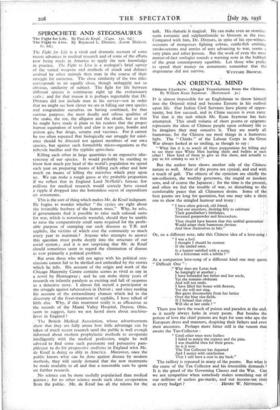Chinese Crackers: Alleged Translations from the Chinese. By William Kean.
Seymour. (Boriswood. 5s.)
AN ORIENTAL MIND
IT is almost Impcissible for -an Englishinan to throw himself into the Oriental mind and become Eastern in his outlook
upon life. Our Indian Civil Servants 'have plenty of oppor- tunity, but feW Succeed, and in China 'success is even rarer. Yet that is the task which Mr. Kean Seymour has here attempted. This small volume of short poems or epigrams represents the ideas of Chinese people upon ordinary life as he imagines they- may conceive -It. They are nearly all humorcius, for the Chinese see most things in a humorous light. The " Chinks " of the Labour Corps in the Great War always looked at us smiling, as though to say : " What fun it is to watch all these preparations for killing and to see these nice White Men hurling shells and bullets at each other ! How kind of them to give us this show, and actually to pay us for coming to see it ! "
But the author here shows another side of the Chinese nature as well. Most of the poems are cynical, and end with a touch of gall. .The objects of the cynicism are chiefly the tax-collectors, the wealthy governors, the stupid or insolent sons, and of course the Japanese ; for the time is the present, and often we feel the trouble of war, so disturbing to the comfortable peace that all Chinamen desire. Some of the best poeins - are long for quotation, but one may take a short
one to show the mingled humour and irony :
" I have often grieved, old friend,
That our ancestors, desiring fitly to celebrate Their grandfather's birthdays, Invented gunpowder and firecrackers.
They should have known that this unfilial generation Would- adapt their humorous devices And blow themselves to bits."
Or, on a different note, take this Chinese idea of a love-song:
" I was a fool.
I thought I should be content If she smiled once.
Is a hunter-satisfied with a scent, Or a fisherman with a nibble ? "
-As a companion love-song of a different kind one may quote " Difficult One " : • ," Why does my Lotus look , So longingly at another ;
I have beheaded her father and her uncle,
Yet she remains obdurate Ahd will not smile.
I have filled her house with flowers, Yet she will not sing, But gazes disconsolate from her lattice Over the blue rice-fields. - - If I behead that other Will she at last smile ? "
There you have the touch of poison and paradox at the end, as it nearly always lurks in every poem. But besides the poison of love the chief poisons are kept for sons who ape the European dress and manners, despising their fathers and even their ancestors. Perhaps more bitter still is the venom that awaits the Tax-Collector : " Until other trees were leafless I failed to notice the cypress and the pine. I was thankful then for their green.
So is it now. The Tax Collector has departed
And I notice with satisfaction -
That I still have a coat to my back."
The raillery is repeated in many of the poems. But what is the cause of the Tax Collector and his irresistible demands ? It is the greed of the Governing Classes and the War. Can we not sympathise when somebody makes something out cif our millions of useless gas-masks, and our income-tax. rises


































 Previous page
Previous page